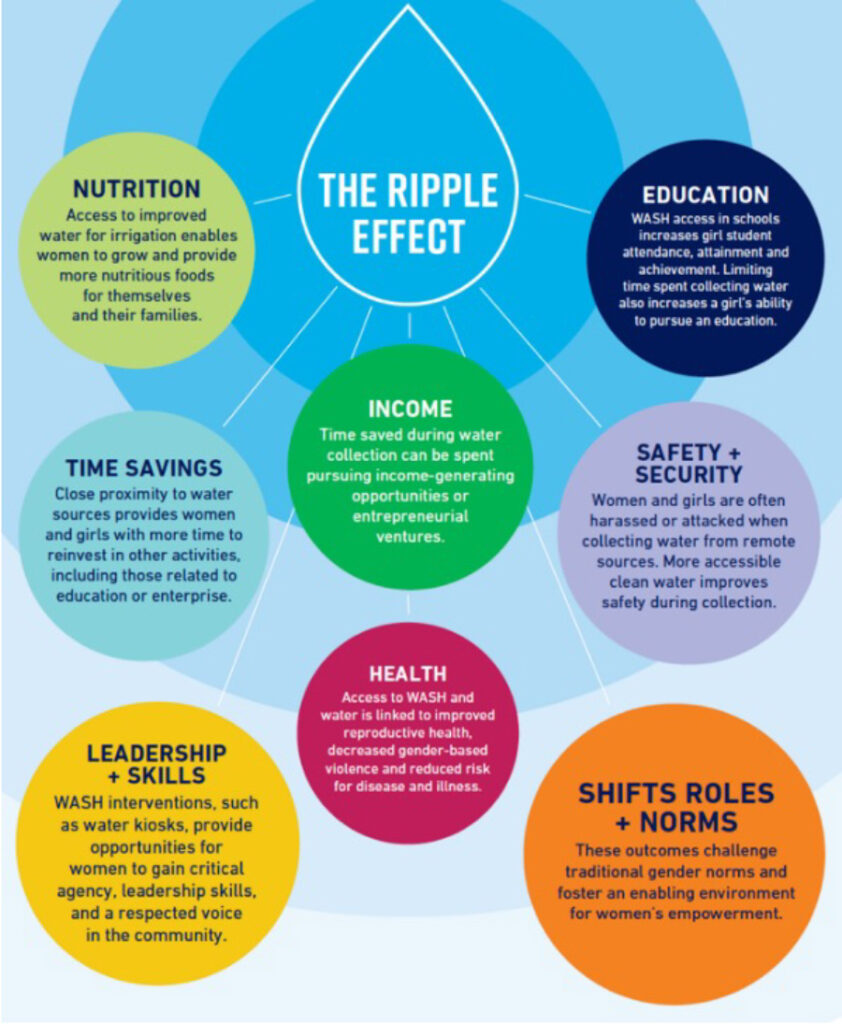Investing in Clean Water Is Investing in Women: Mobilizing A Ripple Effect for Resilience
Clean water access is a foundation for achieving the sustainable development goals: a low-cost, high-impact investment that catalyzes the transformation of households and communities and amplifies the potential of women and girls.
On this International Women’s Day, we celebrate the world’s greatest multitaskers: women. One of the most impactful strategies that philanthropists and impact investors can employ to lift women out of poverty is to invest in clean water and sanitation for their communities. Water is fundamental to life, health, and economic security. It enables ALL people to participate fully and equitably in economic and social life.
Around the world, women and girls spend their days walking miles, waiting in long lines, and experiencing harassment to collect water that is often unsafe to drink. Climate change is making this worse by increasing water scarcity, and the Covid-19 pandemic has further deepened women and girls’ vulnerability by increasing the burden of care, placing additional pressures on the water resources needed to fight the disease, and restricting economic opportunity.
Women and girls, therefore, benefit from investment in improved water access in fundamentally different ways to households and communities more broadly. When we invest to mobilize safe, affordable water and sanitation access for vulnerable communities, we create a ripple effect, starting with women and girls, that builds community resilience. Water access increases women and girls’ opportunities to improve health and wellbeing, to be educated, and to generate income, and as a result, to challenge traditional roles and gender norms.

Yet, women should not be seen as passive beneficiaries of investments in water access: as stewards of household and community resources, they are essential leaders of sustainable development, public health, and climate resilience solutions. By investing in water, we invest in women, and by investing in women, we accelerate progress by increasing capacity to address multiple development challenges at the same time. In other words, we mobilize our dollars into “multi-taskers” too.
The evidence for this is strong. GWC, in collaboration with The Coca-Cola Foundation, Water and Development Alliance (WADA), and Ipsos, supported the pathbreaking Ripple Effect Study, delivering quantitative and qualitative evidence that clean water uniquely catalyzes a shift towards women taking greater control over their lives, and that they use this to benefit whole communities.
Specifically, the study found that water access:
- Transforms the role of women through a reduction in time spent collecting water, time that can be spent on productive or leisure activities
- Improves the health and wellbeing of households by reducing physical and mental illness, including gender-based violence
- Shifts the perception of – and increases respect for – women in households and communities, including women as leaders
- Increases women’s power over resources, which they use to build resilience to economic and environmental uncertainty
The study’s insights and tools have been widely adopted by civil society and the private sector as foundational indicators to quantify women’s empowerment through improved water access.
To accelerate impact in communities around the world, GWC established the women for water platform to mobilize collective action for clean water access for every woman and her community. Thus far, the campaign has mobilized funds and impact for women and their communities in 21 countries across Africa, North and South America, the Middle East, and Central Asia.
On this day, we invite you to join the movement and help create a Ripple Effect that builds resilience for women and their communities. It all begins with clean water.
###
Grounded on the pathbreaking Ripple Effect Study research, women for water is a Global Water Challenge (GWC) collective action platform mobilizing efforts to bring clean water access to every woman and her community. Currently scaling impact in 21 countries across Africa, North and South America, the Middle East and Central Asia, women for water measurably contributes to economic empowerment outcomes while raising awareness about the issue through brands, influencers and consumers.